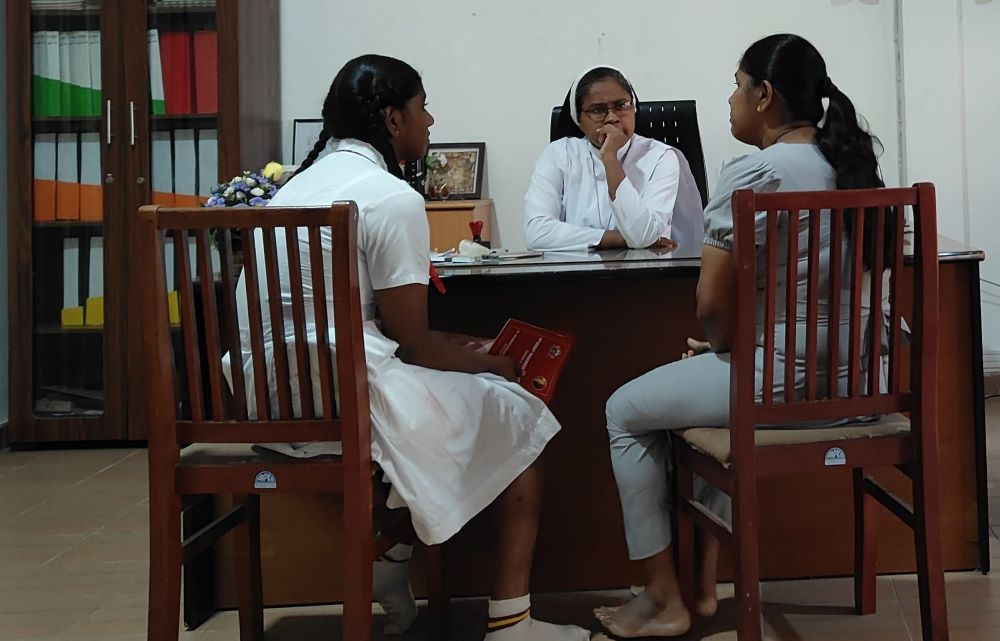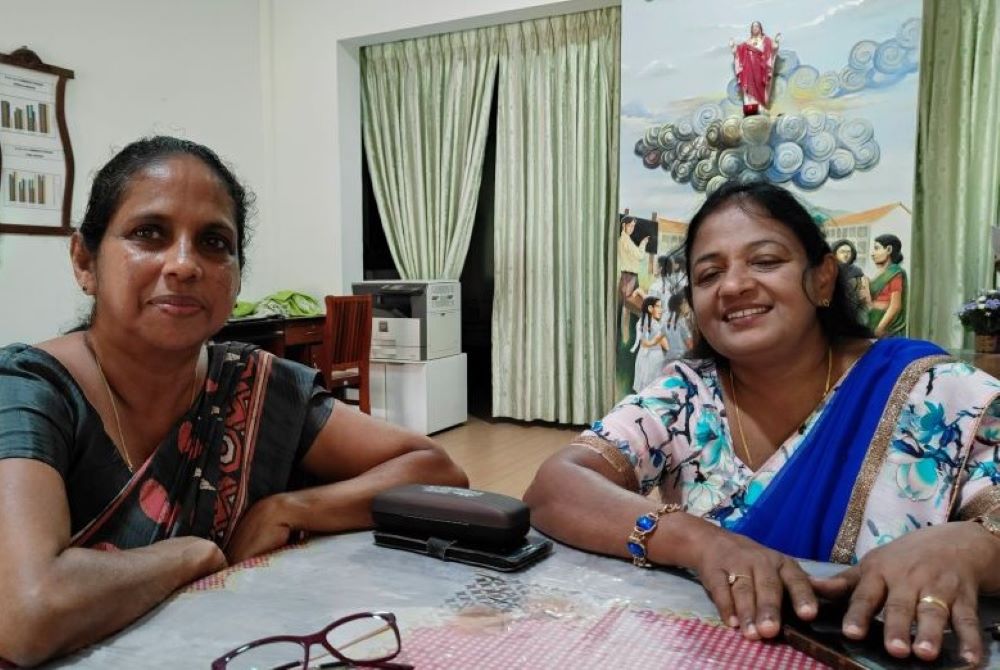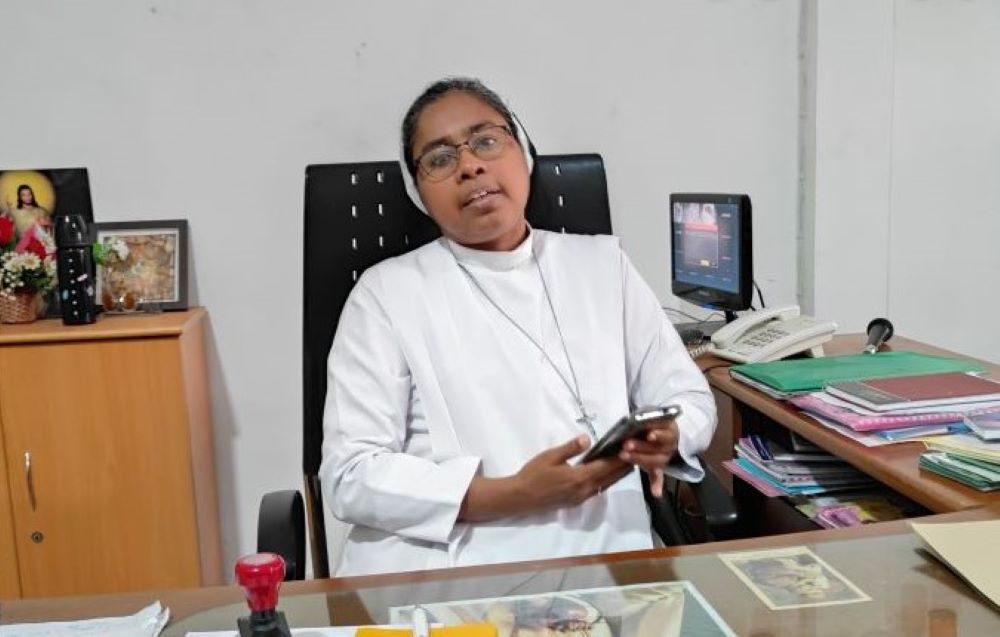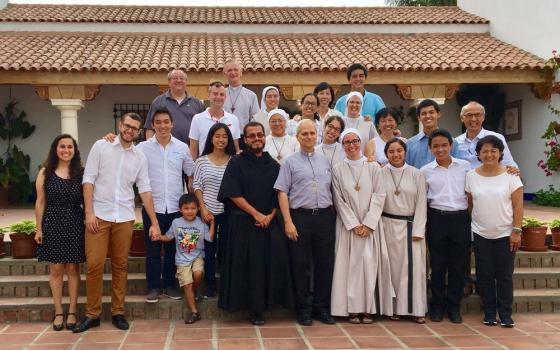
Christina Rishini and Sheboni Nihansa, students at St. Anthony's Girls School, in Colombo, Sri Lanka, share their experiences studying at a government school managed by the Apostolic Carmel nuns. (Thomas Scaria)
Almost 65 years have passed since the Apostolic Carmel sisters and other Catholic religious congregations in Sri Lanka gave their educational institutions to the government. However, their reputation as educators remains intact.
"Overnight, all our schools turned into government schools, and we became government employees," Apostolic Carmel Sr. Mary Ann Christine, principal of St. Anthony's Girls School (St. Anthony's Balika Maha Vidyalaya) in Colombo, told Global Sisters Report.
The Sri Lankan government in 1960 nationalized all private schools through an ordinance.
Fr. Gemunu Dias, the national director of Catholic education in Sri Lanka, said the government took over 690 Catholic schools in the same year. They included schools managed by dioceses and religious congregations of both men and women.
Many schools were placed under the provincial government and the rest under the federal government, Dias said.
During the takeover, the government had given the option to maintain private schools with self-funding, but only a few Catholic institutions took the risk, said Dias, who lives at the archbishop's house in Colombo, the nation's capital.

Apostolic Carmel Sr. Mary Ann Christine, principal of St. Anthony’s School in Colombo, interacts with a student and her mother on the student's progress report. (Thomas Scaria)
Christine, who coordinates her congregation's education ministry, said only one of their 20 schools is private.
Following the government order, Sri Lanka's Ministry of Education took over all educational institutions and their assets, giving their owners "no compensation," Christine said. She is the principal of one of 327 schools directly managed by Sri Lanka's federal government.
However, she said, church institutions never compromised on their quality education after nationalization.
Her students are proud of studying in a convent school.
"We love our principal and teachers," said Christina Rishini, a 10th grader at the school.
Sheboni Nihansa, another student, pointed out that their street has retained its century-old name, St. Anthony's Mawatha (Road).
Students at St. Anthony's Girls School feel they are studying at a convent school, "and that's a great credit for us," Christine said.
On Jan. 27, she was busy meeting with teachers, parents and students, who had lined up outside her office on the first day after mid-term holidays.
"One good thing the government did was to allow the institutions' [spirit] and names to continue. It also allowed sisters and priests [to] manage the schools," Christine said. She is in her early 40s and earns about 80,000 Sri Lankan rupees (US$270) a month.
Advertisement
More than 80 Apostolic Carmel sisters teach in government schools.
The congregation, based at Mangalore in India, started its first school in Sri Lanka at Trincomalee, some 165 miles northeast of Colombo, at the invitation of local Jesuit Bishop Gaston Robichez. They took over St. Mary's Matriculation Higher Secondary School from the Sisters of St. Joseph of Cluny, who did not have enough members to manage it.
The school has more than 1,600 students. More than 65% are Christians, with Hindus, Muslims and Buddhists making up the rest.
Apostolic Carmel Sr. Mary Nirosha, the principal, said the government has allowed students to practice any religion in the school.
"When the country gained independence from the British in 1948, almost all schools were Catholic or Christian," Apostolic Carmel provincial Sr. Mary Nilanthi told GSR in her office in Colombo.
However, she added, schools faced several challenges under new governments in the post-independence era, including policies calling for the use of the Sinhala language only in schools and, later, allowing the Tamil language.
"Everyone had respect for convent schools, and the sisters enjoyed a better status, which helped us continue our mission," Nilanthi said.
Nationalization allowed the nuns to interact more closely with the local population, the provincial said.
"Working under the government has given us identity and recognition in society," she said.

Vatsala Adhikari, a Buddhist teacher at St. Anthony's Girls School in Colombo, and her colleague Lourdes Prashanthi, who is Catholic, share their experiences working with Catholic nuns at a government school. (Thomas Scaria)
Although Buddhism is Sri Lanka's official religion, the government and people tolerate and appreciate Christian missionaries and their contributions to nation-building, Nilanthi said.
"So, we have full freedom and dignity," she said.
However, nationalization has affected the economic status of most Catholic congregations.
About 250 Apostolic Carmel sisters minister in Sri Lanka, including 80 who work in schools and colleges and earn an average of US$250 a month.
Their salaries also support hostels and boarding houses for poor girls.
Nirosha earns less than $300 a month, even after several years of teaching.
"But we are proud to work with the government as our satisfaction as teachers is [a] thousand times better," she said.
Sr. Mary Sanjeevani, principal of All Saints' College in Colombo, sees many benefits in working within a government school.
"We have around 800 students from all religious backgrounds. They all live in harmony and understanding," Sanjeevani said.
All students learn about Jesus and his message to humanity, she said, and she encourages Christian students to understand and respect other religions.
"In my two decades of service as a teacher, I have worked under several Catholic nun principals," said Vatsala Adhikari, a Buddhist who attended a Catholic school and now teaches at St. Anthony's Girls School.
Catholic schools, she said, impart discipline and values and maintain good standards.
Lourdes Prashanthi, a teacher who is Catholic said she is happy the school's multi-religious context allows the celebration of the festivals of all religions.

Sr. Mary Ann Christine is the principal of St. Anthony's Girls School in Colombo, Sri Lanka. Sri Lanka nationalized the school in 1960, but the Apostolic Carmel sisters still manage it. (Thomas Scaria)
Dias said English education and private institutions returned to Sri Lanka after the country liberalized its policies in the 1980s.
He added that when some dioceses and male congregations set up international schools, most of the female congregations continued to work with the government.
Christine said the church strongly objected to nationalization when it was introduced, as they had to give away their schools and properties.
"However, nationalization turned out to be a blessing in disguise," she said. "We don't have to worry about filling our seats, collecting fees, seeking donations, expanding our buildings or competing for [ratings]."
Nationalization also brought education to the children of poor farmers and fishermen, who could have never imagined studying in Christian schools.
Apostolic Carmel superior general Sr. Maria Nirmalini, who is Indian, said nationalization did not affect their original vision and mission for education.
"Our people are as effective as before, but the only challenge is the low income," she told GSR after completing her canonical visits in Sri Lanka.
Dias said the Christian presence in education has helped Sri Lanka achieve a 96.3% adult literacy rate, much higher than the global average.
Nirosha is the Trincomalee school's 21st principal.
"I will retire next year and carry fond memories of working in a government school," Nirosha said.





